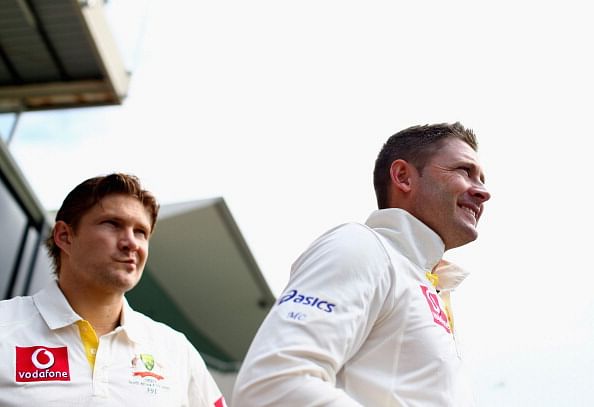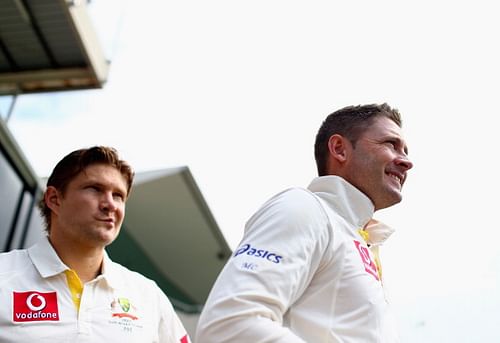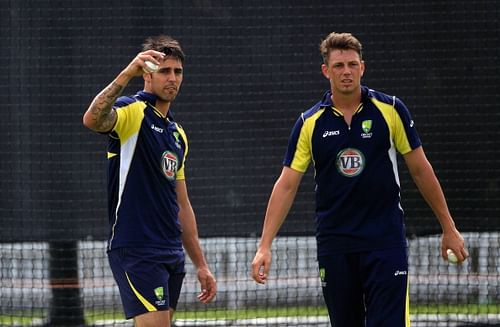
Australia might have shot itself in the foot
Not satisfied that India is doing a good enough job of it, the Australian tour management has sought to plunge the team into further disarray. Word filtered through from the Australian camp that James Pattinson, Shane Watson, Usman Kwawaja and Mitchell Johnson had been removed from consideration for the third Test as punishment for their failure to complete a team assignment. The four failed to comply with the coach’s instructions that each squad member should list points where they thought they could improve as individuals, and points that the team could improve on.

Michael Clarke will not have the services of his vice-captain, Shane Watson.
Captain Michael Clarke has explained that this was not the only infraction. Apparently the management has, for some time now, felt that the players were not living up the the standards, “an Australian cricket team needs to present itself to achieve what we are trying to achieve,” and they felt they had come to a “line-in-the-sand moment.”
But the coach also said that Watson, especially, but also Johnson, had been model professionals who prepared properly and never short-changed the team. He wished, he admitted, that neither man were involved as they were leaders within the team. But under the circumstances, they too had to be punished.
What this means is that two players who had upheld the team’s standards have been sidelined because it was decided that a stand would be taken on this occasion. Never mind the fact that others were more culpable of breaching team protocol, justice would also be visited upon two of the more innocent members of the squad.
Now I’m not saying that team rules should not be followed and assigned duties ignored, but for the management to cite this last incident — one almost everyone classifies as mundane — as the trigger for such drastic action exposes them to derision. Already we see former players and pundits likening the assignment to children doing homework. “It’s not the under 6s, this is Test cricket,” volunteered former Australian Test batsman Mark Waugh. “What’s wrong with Aussie cricket? Didn’t realize you had to do an essay to get selection these days!!!” was former England captain Michael Vaughn’s response. Michael Clarke and the rest of his management team made Australian cricket a laughing stock.
Come to think of it, much of this was totally unnecessary. The Australians’ poor performance on this tour is not difficult to decipher. Indeed, long before the series started, there were quite a number of analysts who predicted how the games would have come to pass.
The Australians are, as a team, ill equipped to compete against India on the dusty pitches of the subcontinent. Had this encounter occurred on Australian soil, then chances are they would have been the ones leading at this point. But the tourists are playing in conditions that diminish their strengths and exacerbate their weaknesses. Their seam attack, which would probably have been too much for India to handle in Perth, was hardly a discomfort in Hyderabad.
Australia has also been hampered by a lack of high quality spinners in their ranks. Whereas the hometown slow bowlers have scythed through their opponents’ batting line-up, their visiting counterparts have managed, in contrast, only a few wickets for a mountain of runs.

With the loss of Mitchell Johnson and James Pattinson, Australia’s pace attack seems bleak.
Save for Michael Clarke, who is a genius at counteracting the turning ball, and whose methods should be patented and preserved for the benefit of coming generations, the tourists are neophytes on such tough surfaces against top class bowlers. Moises Henriques and Matthew Wade have, on occasion, shown they may be up to the task, but the batting, as a whole has been short of what is required.
But to return to the matter at hand, the Australians have now not only removed their best bowler on the tour, they have also removed Mitchell Johnson, who might have thrived on the more seam-friendly Mohali track, and one of their best and most experienced batsmen from consideration for the third Test. Not that these factors should matter in disciplinary matters: punishment should be dispensed without any consideration for a player’s ability. But it should not be done in such a haphazard and puerile manner.
It is now difficult to see, with all the distractions swirling around, how Australia will report to Mohali in a satisfactory frame of mind. It will be difficult for them to get worse than they were in the first two Tests but it is not impossible. Nonetheless, adversity has a way of concentrating the mind and stiffening resolve. Mohali was supposed to provide Australia with the platform from which to launch a serious challenge to India’s dominance. Their fans will be trusting that despite all the problems, they may still be able to mount a strong challenge.